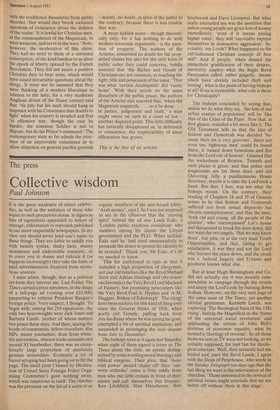The press
Collective wisdom
Paul Johnson
It is the great weakness of minor celebrities, as well as the ambition of those who aspire to such precarious status, to figure in lists of signatories appended to letters of outrage, exhortation or reproach published in our more respectable newspapers. In my view one should never lend one's name to these things. They are liable to saddle you With beastly syntax, shaky facts, muzzy sentiments and undesirable company, or to cover you in shame and ridicule if (as happens increasingly) they take the form of paid advertisements financed from mysterious sources.
I must admit, though, that as a political art-form they interest me. Last Friday The Times carried a prize specimen, in the shape of a full-page ad (costing over £10,000) purporting to criticise President Reagan's foreign policy. Very suspect, I thought. To begin with, among the 219 signatories, the only two heavyweights were Jack Jones and Barbara Castle, neither of whom matters two pence these days. And then, among the horde of communists, fellow-travellers, dim MPs, minor journalists, dons from whitetile universities, obscure trade unionists and second XI busybodies, there was an exceptionally large proportion of absolutely genuine nonentities. Evidently a lot of barrel-scraping had been going on to fill the page. The small print (`Issued by Declaration of United Sates Foreign Policy Organising Committee') gave nothing away, which was suspicious in itself. The clincher was the presence on the list of a score or so regular members of the anti-Israeli lobby. 'Arab money', says!. So I was not surprised to see in the Observer that the 'moving spirit' behind the ad was Louis Eaks, a 'London public relations consultant' who numbers among his clients the Libyan government and the PLO. When tackled, Eaks said he 'had tried unsuccessfully to persuade the donor to permit his identity to be revealed'. Thank you, Mr Eaks, it's all we needed to know.
This list conformed to type in that it included a high proportion of clergymen, not just old familiars like the Revd Michael Scott and Adrian Hastings and (my sonorous favourite) the Very Revd Lord Macleod of Fuinary, but promising newcomers like the Very Revd Paul A. Hypher and 'AM. Haggart, Bishop of Edinburgh'. The clergy have been suckers for this kind of thing ever since the General Strike of 1926, when portly old Temple, puffing back from Aix-les-Bains where he was curing his gout, attempted a bit of spiritual mediation, and succeeded in prolonging the coal dispute from July to December.
The bishops were at it again last Saturday when eight of them signed a letter to The Times about the riots, an epistle distinguished by some startling moral theology and biblical exegesis. Their plea, that 'those with power' should 'shake off' their 'outworn attitudes' came a little oddly from men who put little crosses in front of their names and call themselves Jim Stepney, Ken Litchfield, Stan Manchester, Ron Southwark and Dave Liverpool. But what really interested me was the assertion that unless young people are given lots of money immediately, 'even if it means paying higher taxes', they will 'inevitably express themselves in destructive aggression'. Inevitably, my Lords? What happened to the old-fashioned Christian concept of free will? And if people, when denied the immediate gratification of their desires, inevitably employ what the Right Revd Gentlemen called, rather gingerly, 'means which have already included theft and looting', what is the point of having bishops at all? If sin is irresistible, what role is there for Christianity?
The bishops concluded by saying that, unless we do what they say, 'the fate of our urban centres of population' will be 'like that of the Cities of the Plain'. Now that, at first glance, sounded a bit more like it. The Old Testament tells us that the fate of Sodom and Gomorrah was decided 'because their sin is very grievous'. Since not even ten 'righteous men' could be found there, it 'rained down brimstone and fire from the Lord out of heaven'. Granted that the wickedness of Brixton, Toxteth and such places is great, and that police and magistrates are lax these days, and old Quivering Jelly a pusillanimous Home Secretary, maybe it is time the Lord took a hand. But that, I fear, was not what the bishops meant. On the contrary, their reading of Chapters 18 and 19 of Genesis seems to be that Sodom and Gomorrah suffered not from sexual depravity but chronic unemployment, and that the men, 'both old and young, all the people of the quarter', who 'encompassed' Lot's house and threatened to break his door down, did not want the two angels, 'that we may know them', but jobs, or at the very least Youth Opportunities, and that, failing to get satisfaction, it was they and not the Lord who burned the place down, and the result was a Judicial Inquiry and U-turns and goodness knows what else.
But at least Hugh Birmingham and Co. did not actually say it was morally commendable to rampage through the streets and usurp the Lord's role by burning down Sodom. However, on the very next page of the same issue of The Times, yet another clerical gentleman, Kenneth Leech, was exploring 'The theological basis of the 1381 rising', hailing the Magnificat as the 'hymn of the universal social revolution' and applauding the virtues of John Ball's doctrine of economic equality, what he termed a 'theology of reversal'. So all those mobs we saw on TV were not looking, as we unfairly supposed, for loot but for theological concepts. Well, they certainly had me fooled and, pace the Revd Leech, I agree with the Dean of Peterhouse, who wrote in the Sunday Telegraph ten days ago that the last thing we want is the intervention of the churches: 'Those interested in the revival of spiritual values might conclude that we are better off without them at this stage'.


































 Previous page
Previous page